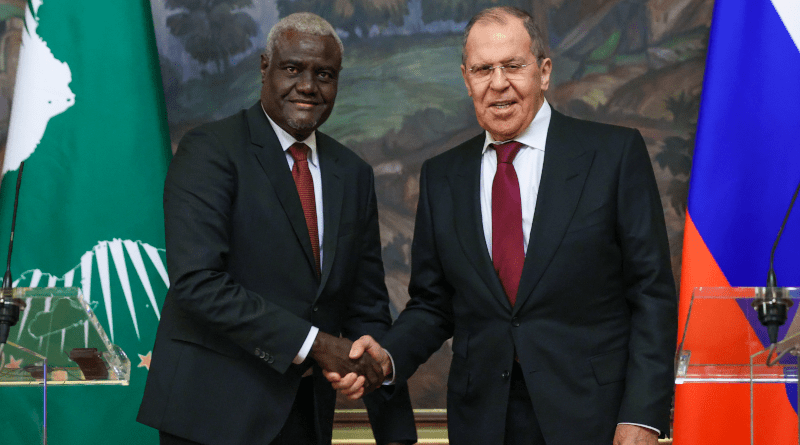Russia’s Cooperation Agreement With African Union: Economic And Geopolitical Implications – OpEd
On November 16, Foreign Minister Sergey Lavrov held diplomatic talks with his counterpart, Chairperson of the African Union Commission Moussa Faki Mahamat, who paid a working visit to Moscow, Russia. The talks, intended to strengthen political dialogue, also focused on the search for effective ways to scale-up development in Africa.
As Sergey Lavrov concretely noted: “the relations between Russia and the African Union are on the rise and expanding in various areas. The first ever Russia-Africa summit held in Sochi in October 2019 confirmed this. We have been collaborating in a variety of formats since then. But today, we have a perfect opportunity to consider the entire scope of ties between the Russian Federation and the African Union, to see how we can progress in the context of implementing the Sochi summit decisions and preparing for the second summit of the leaders of Russia and African countries.”
In the joint declaration, after the first summit, Russia and African Union have set goals and tasks for the further development of cooperation in all areas: politics, security, the economy, science and technology, culture and humanitarian sphere.
It also highlighted development, trade and investment interaction. While much has theoretically remained unfulfilled, the November talks has, at least, proposed to move from an “ad hoc approach” to “a more comprehensive structured action plan” in dealing with Russia-African Union relations.
Lavrov and Mahamat agreed to transform the “documents approved by the first Russia-Africa Summit” into “An Action Plan 2022 – 2025” that will reinforce and determine the necessary directions for partnership with Africa. It therefore means concrete implementation of deals within the framework of the action plan will begin after second Russia-Africa summit planned for autumn season 2022.
Lavrov has attached importance to establish cooperation between African Union and the Eurasian Economic Union (EAEU), which until now remains a conceptual thought or a grandiose idea. The EAEU is an economic union comprising countries located in northern Eurasia, founded by Belarus, Kazakhstan and Russia by treaty that entered into force on January 1, 2015. As of May 2018, two republics joined – Armenia and Kyrgyzstan.
EAEU’s key objectives include increasing cooperation and economic competitiveness for the member states, and the promotion of stable development in order to raise the standard of living in member states. It was created partly in response to the economic and political influence of the European Union and other Western countries that are desirous to penetrate the former republics of the Soviet Union.
With a view to expanding trade and cooperation, a memorandum of understanding was signed between the Eurasian Economic Commission (EEC) and the African Union Commission at the first summit 2019. While Russia is the most active player among the EAEU group, Belarus and Kazakhstan have some interest, Armenia and Kyrgyzstan have extremely little interest in Africa, according to policy experts.
With concrete Action Plan, Russia will be moving one-step forward from mere intentions, diplomatic niceties and rhetoric to concrete deeds and dealings that make Russia more visible in Africa. Both top most diplomats had an opportunity to discuss the entire spectrum of relations, to see how to advance in the context of implementing the decisions from Sochi summit as well as bilateral cooperation in the UN.
Further, with the establishment of the Association of Economic Cooperation with African Countries (AECAS) under the Russian Ministry of Foreign Affairs, it is highly expected that, specific ideas and projects promoted by the Russian business community will effectively address the Sustainable Development Goals (SDGs) and further be instrumental in implementing the African Union’s main strategic document, Agenda-2063.

